Michael Z. Land (born 1961) is an American video game composer and musician best known for his scores for various games produced by LucasArts.
Michael Z. Land (born 1961) is an American video game composer and musician best known for his scores for various games produced by LucasArts.
Michael Land was born in the North Shore area north of Boston, Massachusetts. His parents enrolled him in classical piano lessons when he was five, and he continued in these until he chose to stop out of frustration at age twelve. He started to play the electric bass guitar a couple of years later. [1] He focused more on improvisation, and he played with several bands throughout high school.
In 1979, Land enrolled in the music program at Harvard University, where he concentrated on electronic music. He also rekindled his interest in classical music, particularly that of Ludwig van Beethoven. After graduation, he entered Mills College in Oakland, California to further study electronic music. He broadened his study to Renaissance polyphony, and he also studied computer programming.
When Land graduated from Mills in 1987, he took a job as a digital technician at an audio signal processor manufacturer called Lexicon. Land worked for the company for three years, a period he spent honing his programming skills and writing operating system software for the company's MIDI remote controllers.
By 1990, the home video game market was beginning to blossom, particularly for personal computers. In April of that year, Land obtained a job at the fledgeling Lucasfilm Games (today known as LucasArts), a software company owned by Star Wars creator George Lucas. Land became the first in-house audio programmer and musician at the company, which had mostly outsourced its sound production duties to third-party developer Realtime Associates in the previous few years. Land's first project with LucasArts was The Secret of Monkey Island . The soundtrack of the game gave the composer a chance to show his flexibility, as it is almost entirely made up of Caribbean-flavored themes, something different from anything Land had composed before. His music from Monkey Island has been performed live by a full orchestra at the Symphonic Game Music Concert in 2004. The event took place in Leipzig, Germany.
The sound engine used in Monkey Island bothered Land, however. He found it nearly impossible to synchronize music with action in the game. Land began work on LucasArts' iMUSE interactive music system to solve this problem. [1] The project was more daunting than Land had anticipated, so he brought in his friend, Peter McConnell, to help. The two designed the iMUSE system as an advanced MIDI sequencer, but over the years, it has come to be, as Land describes it, "a methodology" that allows game producers greater control over in-game music, transitions, etc. Land also headed the company sound department, and since he was preoccupied with iMUSE, he hired another friend to the company, Clint Bajakian, to take over some composing projects.
With iMUSE completed, Land returned to work as composer. He worked on several titles, including more Monkey Island games and various projects based on Lucasfilm properties.
Land continues to widen his repertoire, and he is currently studying classical cello and violin. He plans to release an album of music he has written outside of LucasArts sometime in the future.[ citation needed ]
Michael Land also worked on the Telltale installment of the Monkey Island series, Tales of Monkey Island , and reprises his role in the new Return to Monkey Island with Clint Bajakian and Peter McConnell.
During his teen-age years, Land consciously studied and emulated the styles of performers such as Yes, the Grateful Dead, and Jimi Hendrix. To this day, he cites Hendrix's mellow style as a great influence on his own music, and he claims that the Dead's style is deeply rooted in his own work.
In his adult years, he also studied classical composers, particularly Beethoven, a composer whose accomplishments he describes as "a mountain in the distance … no matter how much ground you cover, it's always just as far away." He also developed an interest in Renaissance polyphony[ citation needed ]. [2]
Land's work shows great variation, a common trait for video game composers. He begins each project by reading over production notes for the game and then deciding on a musical style with the game's producers. Once this is decided, Land listens to different examples of that style. His soundtracks are as varied as the games they accompany. The music of the Monkey Island series is Caribbean in style, tunes performed on light woodwinds and marimbas. On the other hand, his soundtrack for The Dig is cinematic, with dark, brooding themes played out slowly. Land himself cites The Dig score as the work that comes closest to his own personal style. Another trait Land has in common with other video game composers is his ability to compose music that remains listenable when played on a continuous loop.
Land's music also tends to be more ambient in style. This allows him to compose fairly complex pieces but to keep them from being obtrusive to gameplay or spoken dialogue. Each project tends to feature at least a few louder, more melodic pieces, however, usually in the title theme and end credits.
Land's work on The Curse of Monkey Island soundtrack simultaneously marks a compositional coming-of-age, and the advent of digital audio compression meaning that MIDI audio of the past could be replaced with hi-fidelity live audio and live voice recording. This allowed for Land to record the soundtrack with real instruments or high quality patches, which added a warmth and emotion to the music not present in earlier MIDI music.[ citation needed ]
Land's skills as a composer and arranger are no more evident than in his choice of timbre; bringing together European folk and classical instruments with Caribbean and Central American instruments, weaving a texture that combines steel-pans, accordions, and afro-Cuban percussion amongst others. On one hand, heavily influenced by European nationalist music and nautical shanties and horn pipes, and on the other incorporating Caribbean and Brazilian styles.
| Title | Year | Notes |
|---|---|---|
| The Secret of Monkey Island | 1990 | With Barney Jones, Patric Mundy, and Andy Newell |
| Night Shift | Music adaptation | |
| Masterblazer | With Chris Hülsbeck | |
| Secret Weapons of the Luftwaffe | 1991 | |
| Monkey Island 2: LeChuck's Revenge | With Clint Bajakian and Peter McConnell | |
| Indiana Jones and the Fate of Atlantis | 1992 | |
| Star Wars: Rebel Assault | 1993 | Sound advice |
| Star Wars: X-Wing | With Clint Bajakian and Peter McConnell | |
| Day of the Tentacle | ||
| Sam & Max: Hit the Road | ||
| Star Wars: TIE Fighter | 1994 | |
| Star Wars: Dark Forces | 1995 | iMUSE Interactive Music System |
| The Dig | ||
| Full Throttle | iMuse Programming | |
| Afterlife | 1996 | |
| The Curse of Monkey Island | 1997 | With Hans Christian Reumschuessel |
| Ballblazer Champions | Sound Consultant | |
| Outlaws | Manager of Sound Development | |
| Herc's Adventures | Music Composition/Manager | |
| Star Wars: DroidWorks | 1998 | Sound Manager |
| Grim Fandango | Sound Production Supervision | |
| Star Wars: Jedi Knight - Mysteries of the Sith | Production | |
| Star Wars: X-Wing Alliance | 1999 | Music editor |
| Star Wars: Episode I: The Gungan Frontier | Music Editing and additional composition | |
| Star Wars: Episode I: The Phantom Menace | Sound Department Manager | |
| Star Wars: Yoda's Challenge - Activity Center | ||
| Star Wars: Episode I: Racer | ||
| Star Wars: Anakin's Speedway | ||
| Star Wars: Force Commander | 2000 | |
| Star Wars: Episode I: Jedi Power Battles | ||
| Escape from Monkey Island | With Clint Bajakian, Anna Karney, Michael Lande and Peter McConnell | |
| SimCity 4 | 2003 | With various others |
| The Bard's Tale | 2004 | With Tommy Tallarico, Clint Bajakian and Jared Emerson-Johnson |
| Psychonauts | 2005 | Performed bass |
| Thrillville | 2006 | With various others |
| Tales of Monkey Island | 2009 | With John Marsden and Jared Emerson-Johnson |
| The Secret of Monkey Island: Special Edition | Special thanks | |
| Monkey Island 2: LeChuck's Revenge - Special Edition | 2010 | |
| Wak-a-Rat | 2014 | |
| Grim Fandango: Remastered | 2015 | Sound Production Supervision |
| Day of the Tentacle: Remastered | 2016 | Original music |
| Full Throttle: Remastered | 2017 | Mr. Big Music Guy |
| Psychonauts 2 | 2021 | Played electric bass |
| Return to Monkey Island | 2022 | With Clint Bajakian and Peter McConnell |
| Title | Year | Notes |
|---|---|---|
| POWER GAME HITS - Best of adventure and action computer game tracks | 1992 | Compilation of music from various LucasArts games |
| The Best of LucasArts Original Soundtracks | 2002 | |
| Video Games Live: Level 3 | 2014 | Played keyboards |

Day of the Tentacle, also known as Maniac Mansion II: Day of the Tentacle, is a 1993 graphic adventure game developed and published by LucasArts. It is the sequel to the 1987 game Maniac Mansion. The plot follows Bernard Bernoulli and his friends Hoagie and Laverne as they attempt to stop the evil Purple Tentacle - a sentient, disembodied tentacle - from taking over the world. The player takes control of the trio and solves puzzles while using time travel to explore different periods of history.

Lucasfilm Games is an American video game licensor and a subsidiary of Lucasfilm. It was founded in May 1982 by George Lucas as a video game development group alongside his film company; as part of a larger 1990 reorganization of the Lucasfilm divisions, the video game development division was grouped and rebranded as part of LucasArts. LucasArts became known for its line of adventure games based on its SCUMM engine in the 1990s, including Maniac Mansion, the Monkey Island series, and several Indiana Jones titles. A number of influential game developers were alumni of LucasArts from this period, including Brian Moriarty, Tim Schafer, Ron Gilbert, and Dave Grossman. Later, as Lucasfilm regained control over its licensing over the Star Wars franchise, LucasArts produced numerous action-based Star Wars titles in the late 1990s and early 2000s, while dropping adventure game development due to waning interest in the genre.

Monkey Island is a series of adventure games. The first four games were produced and published by LucasArts, earlier known as Lucasfilm Games. The fifth was developed by Telltale Games with LucasArts, while the sixth was developed by Terrible Toybox with Lucasfilm Games and Devolver Digital.
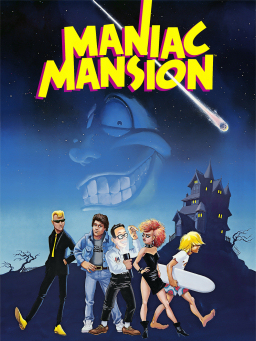
Maniac Mansion is a 1987 graphic adventure video game developed and published by Lucasfilm Games. It follows teenage protagonist Dave Miller as he attempts to rescue his girlfriend Sandy Pantz from a mad scientist, whose mind has been enslaved by a sentient meteor. The player uses a point-and-click interface to guide Dave and two of his six playable friends through the scientist's mansion while solving puzzles and avoiding dangers. Gameplay is non-linear, and the game must be completed in different ways based on the player's choice of characters. Initially released for the Commodore 64 and Apple II, Maniac Mansion was Lucasfilm Games' first self-published product.

Sam & Max is an American media franchise about Sam and Max, a pair of anthropomorphic vigilante private investigators. The characters, who occupy a universe that parodies American popular culture, were created by Steve Purcell in his youth, and later debuted in a 1987 comic book series. The characters have since been the subject of a graphic adventure video game developed by LucasArts, a television series produced for Fox in cooperation with Nelvana Limited, and a series of episodic adventure games developed by Telltale Games. In addition, a variety of machinima and a webcomic have been produced for the series.

Script Creation Utility for Maniac Mansion (SCUMM) is a video game engine developed at Lucasfilm Games, later renamed LucasArts, to ease development on their graphic adventure game Maniac Mansion (1987). It was subsequently used as the engine for later LucasArts adventure games and Humongous Entertainment games.

Loom is a 1990 fantasy-themed graphic adventure game by Lucasfilm Games. The project was led by Brian Moriarty, a former Infocom employee and author of classic text adventures Wishbringer (1985), Trinity (1986), and Beyond Zork (1987). It was the fourth game to use the SCUMM adventure game engine, and the first of those to avoid the verb–object interface introduced in Maniac Mansion.
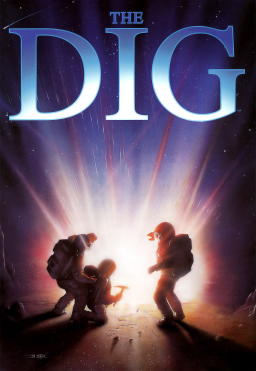
The Dig is a 1995 point-and-click adventure game developed by LucasArts for PC and Macintosh. Like other LucasArts adventure games, it uses the SCUMM video game engine. It features a full voice-acting cast, including voice actors Robert Patrick and Steve Blum, and a digital orchestral score. The game uses a combination of drawn two-dimensional artwork and limited, pre-rendered three-dimensional clips, with the latter created by Industrial Light & Magic.
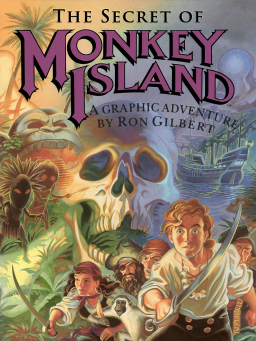
The Secret of Monkey Island is a 1990 point-and-click graphic adventure game developed and published by Lucasfilm Games. It takes place in a fictional version of the Caribbean during the age of piracy. The player assumes the role of Guybrush Threepwood, a young man who dreams of becoming a pirate, and explores fictional islands while solving puzzles.

Monkey Island 2: LeChuck's Revenge is an adventure game developed and published by LucasArts in 1991. A sequel to 1990's The Secret of Monkey Island, it is the second game in the Monkey Island series. It was the sixth LucasArts game to use the SCUMM engine, and the first game to use the iMUSE sound system. In it, pirate Guybrush Threepwood searches for the legendary treasure of Big Whoop and again faces off against the pirate LeChuck, who is now an undead corpse.

Escape from Monkey Island is an adventure game developed and released by LucasArts in 2000. It is the fourth game in the Monkey Island series, and the sequel to the 1997 videogame The Curse of Monkey Island. It is the first game in the series to use 3D graphics and the second game to use the GrimE engine, which was upgraded from its first use in Grim Fandango.

From the late 1980s to the early 2000s, LucasArts was well known for their point-and-click graphic adventure games, nearly all of which received high scoring reviews at the time of their release. Their style tended towards the humorous, often irreverent or slapstick humor, with the exceptions of Loom and The Dig. Their game design philosophy was that the player should never die or reach a complete dead-end, although there were exceptions.
iMUSE is an interactive music system used in a number of LucasArts video games. The idea behind iMUSE is to synchronize music with the visual action in a video game so that the audio continuously matches the on-screen events and transitions from one musical theme to another are done seamlessly. iMUSE was developed in the early 1990s by composers Michael Land and Peter McConnell while working at LucasArts. The iMUSE system was patented by LucasArts in 1994, after being added to the fifth version of the SCUMM game engine in 1991.

Peter Nelson McConnell, also known as Peter Mc, is an American video game composer and musician, best known for his work at LucasArts and for composing the soundtracks for every Sly Cooper game since the second installment.
Clint Bajakian is an American video game composer and musician.
Mark Griskey is an American composer for video games such as Marvel Heroes, Star Wars: Knights of the Old Republic II: The Sith Lords, and Star Wars: The Old Republic as well as several titles for Disney Publishing Worldwide. He was a founding member of X-Ray Dog.

Jared Nathaniel Emerson-Johnson is an American video game music composer, sound designer, voice director and voice actor. Emerson-Johnson is the Music Supervisor and lead composer at Bay Area Sound, an audio production company specializing in sound design, music and voiceover for video games. His work has been predominantly featured in games developed by Telltale.
In video games, adaptive music is background music whose volume, rhythm or tune changes in response to specific events in the game.
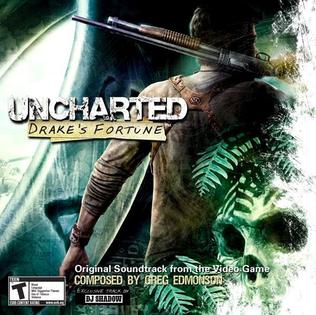
Uncharted: Drake's Fortune Original Soundtrack from the Video Game is the soundtrack to the 2007 action-adventure video game Uncharted: Drake's Fortune, developed by Naughty Dog. Composed by Greg Edmonson and performed by the Skywalker Session Orchestra, it was released on November 20, 2007 by the game's publisher, Sony Computer Entertainment.
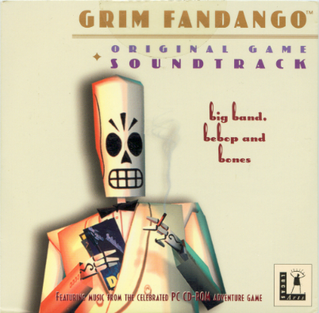
The music for the video game Grim Fandango was composed and produced by Peter McConnell and published by LucasArts in 1998. The soundtrack is a mix of South American folk music, jazz, swing and big band sounds, for the game story filled with adventure and intrigue set in a unique combination of film noir and Mexican folklore's Day of the Dead. The soundtrack garnered critical acclaim and remained subject of positive reviews and inclusion in critics' rankings for the two decades after its first release. The soundtrack was praised both as a stand-alone musical experience, as well as for its outstanding contribution to the overall game experience; capturing the spirit of the game, "gluing" the story together, and becoming "integral" to the success of the game.